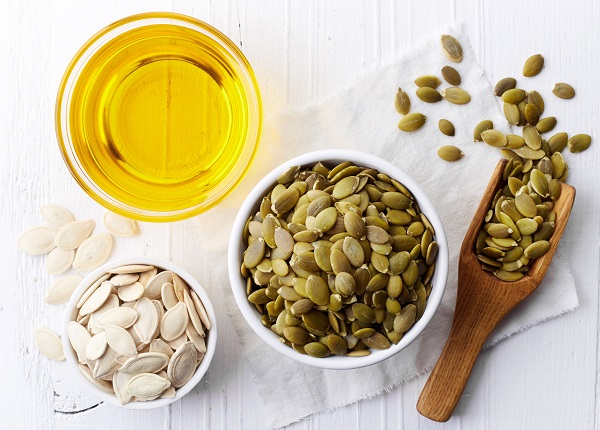Pumpkin Seed: Hypoallergenic Vegan Protein Source
With more people choosing vegetarian and vegan diets, there is an increased need for a high-quality, plant-derived protein supplement. According to a 2015 survey of over 1,500 Canadians aged 18 or older, approximately 8% reported being vegetarian or mostly vegetarian, while 25% reported “trying to eat less meat.”[1] This is generally higher among those aged 18–35 years.[1] Since plant sources contain less protein per serving compared to animal foods, vegetarians and vegans often require protein supplementation to meet recommendations. Complicating this is the fact that many vegetarians may have food sensitivities that further limit their ability to supplement with some of the more commonly available protein sources, such as soy or whey proteins.[2] Pumpkin seed protein fills this gap.
 Pumpkin seed protein is a high-quality protein source that is also rich in nutrients including omega-3, -6, and -9 fatty acids such as alpha-linolenic acid (ALA), linoleic acid (LA), and oleic acid, respectively, as well as antioxidant vitamins including carotenoids and tocopherol.[3] In one study of 30 patients on dialysis, the effect of adding 30 g of milled sesame, pumpkin, flax (6 g, 6 g, or 18 g, respectively) seeds mixture to patients’ diets was assessed.[3] After 12 weeks, these patients had an increase in blood levels of fatty acids—linoleic, dihomo-gamma-linolenic (DGLA), arachidonic, alpha-linolenic (ALA), eicosapentaenoic (EPA), docosapentaenoic, and docosahexaenoic (DHA) acids. In addition, seed intake was associated with decreases in serum triglycerides, glucose, insulin, IR-HOMA (a measure of insulin resistance), as well as a number of inflammatory markers (TNF-alpha, IL-6, and hs-CRP).
Pumpkin seed protein is a high-quality protein source that is also rich in nutrients including omega-3, -6, and -9 fatty acids such as alpha-linolenic acid (ALA), linoleic acid (LA), and oleic acid, respectively, as well as antioxidant vitamins including carotenoids and tocopherol.[3] In one study of 30 patients on dialysis, the effect of adding 30 g of milled sesame, pumpkin, flax (6 g, 6 g, or 18 g, respectively) seeds mixture to patients’ diets was assessed.[3] After 12 weeks, these patients had an increase in blood levels of fatty acids—linoleic, dihomo-gamma-linolenic (DGLA), arachidonic, alpha-linolenic (ALA), eicosapentaenoic (EPA), docosapentaenoic, and docosahexaenoic (DHA) acids. In addition, seed intake was associated with decreases in serum triglycerides, glucose, insulin, IR-HOMA (a measure of insulin resistance), as well as a number of inflammatory markers (TNF-alpha, IL-6, and hs-CRP).
Pumpkin seeds are a rich plant source of iron, containing up to 4.0 mg per 30 g of pumpkin seed kernels.[4] Supplementation with pumpkin seed kernels has been shown to help improve iron status in women.[4] In a study of eight women, supplementation with a total of 30 g of iron-fortified cereal (7.1 mg iron) plus 30 g of pumpkin seed kernels (4.0 mg iron) daily for 4 weeks resulted in a substantial increase in iron status compared to baseline.[4] Serum iron increased from 60 to 85 µg/dl, transferrin saturation increased from 16 to 25%, and total iron-binding capacity decreased from 339 to 367 µg/dl, all indicating better iron status.
Pumpkin seed protein contains all nine of the essential amino acids (*), and a 30 g serving contains approximately:
- Glutamic acid 3.3 g
- Arginine 2.6 g
- Aspartic acid 1.6 g
- Leucine 1.2 g
- Glycine 1.0 g
- Phenylalanine 0.9 g
- Tryptophan 0.9 g
- Valine 0.9 g
- Alanine 0.8 g
- Serine 0.7 g
- Isoleucine 0.7 g
- Proline 0.7 g
- Tyrosine 0.5 g
- Lysine 0.5 g
- Threonine 0.4 g
- Histidine 0.3 g
- Methionine 0.3 g
- Cystine 0.1 g
Since it is hypoallergenic, pumpkin seed protein is an ideal protein source for individuals with sensitivities to some of the more common vegan proteins such as soy, rice, and whey. Food sensitivities may be associated with a wide range of symptoms including atopic eczema, asthma, gastroesophageal reflux (GERD), irritable bowel syndrome (IBS) and other digestive problems,[2] as well as migraines, arthritis, chronic pain, recurrent infections, and various autoimmune presentations.
Pumpkin seed protein is also a particularly rich source of the amino acid tryptophan, which acts as a precursor for serotonin, an important neurotransmitter involved in the regulation of mood, sleep, motivation, appetite, and more.[5] In particular, pumpkin seed protein rich in tryptophan consumed in combination with glucose seems to push high amounts of tryptophan across the blood-brain barrier, as the glucose reduces serum levels of competing large neutral amino acids (LNAAs).[6] In a randomized controlled trial (RCT), 57 patients with chronic insomnia were supplemented with either 1) gourd protein–sourced tryptophan plus carbohydrate, 2) pharmaceutical-grade tryptophan, or 3) carbohydrate alone. Supplementation with protein-sourced tryptophan plus carbohydrate resulted in significant improvement on subjective and objective measures of insomnia. Protein-sourced tryptophan with carbohydrate but not pharmaceutical tryptophan alone was also effective in significantly reducing time awake during the night.[5]
Another study in patients with social anxiety, using the same protein-derived tryptophan plus carbohydrate in a bar format, showed an improvement in measures of anxiety.[7]
 Finally, another study evaluated the effects of pumpkin seed oil on metabolic parameters as well as menopausal symptoms.[7] In an RCT of 35 postmenopausal women, supplementation with pumpkin seed oil for 12 weeks resulted in a significant increase in HDL (“good”) cholesterol, and a decrease in diastolic blood pressure (−6 mmHg), compared to wheat-germ oil. In addition, women receiving pumpkin seed oil reported a significant improvement in the menopausal symptom scores, with a decrease in severity of hot flushes, less headaches, and less joint pains.
Finally, another study evaluated the effects of pumpkin seed oil on metabolic parameters as well as menopausal symptoms.[7] In an RCT of 35 postmenopausal women, supplementation with pumpkin seed oil for 12 weeks resulted in a significant increase in HDL (“good”) cholesterol, and a decrease in diastolic blood pressure (−6 mmHg), compared to wheat-germ oil. In addition, women receiving pumpkin seed oil reported a significant improvement in the menopausal symptom scores, with a decrease in severity of hot flushes, less headaches, and less joint pains.
In conclusion, pumpkin seed protein is a high-quality, hypoallergenic, and nutrient-dense plant protein source that is ideal for vegetarians and vegans. Pumpkin seed protein is high in omega-3 and omega-6 fatty acids; is a good plant source of iron; and is a good source of tryptophan, a precursor for serotonin in the brain. Pumpkin seed protein has been shown to exert beneficial metabolic effects on cholesterol, blood glucose, and insulin resistance, as well as anti-inflammatory effects. Finally, tryptophan from pumpkin seed may improve insomnia and symptoms associated with menopause.
References
- Statista. Prevalence of vegetarian consumers and people attempting to eat less meat in Canada in 2015. · https://www.statista.com/statistics/544771/vegetarian-prevalence-canada/ · Published 2016-03. · Accessed 2018-11-13.
- Ho, M.H., W.H. Wong, and C. Chang. “Clinical spectrum of food allergies: A comprehensive review.” Clinical Reviews in Allergy & Immunology, Vol. 46, No. 3 (2014): 225–240.
- Ristic-Medic, D., et al. “Effects of dietary milled seed mixture on fatty acid status and inflammatory markers in patients on hemodialysis.” TheScientificWorldJournal, Vol. 2014 (2014): 563576.
- Naghii, M.R., and M. Mofid. “Impact of daily consumption of iron fortified ready-to-eat cereal and pumpkin seed kernels (Cucurbita pepo) on serum iron in adult women.” Biofactors, Vol. 30, No. 1 (2007): 19–26.
- Hudson, C., et al. “Protein source tryptophan versus pharmaceutical grade tryptophan as an efficacious treatment for chronic insomnia.” Nutritional Neuroscience, Vol. 8, No. 2 (2005): 121–127.
- Hudson, C., S. Hudson, and J. MacKenzie. “Protein-source tryptophan as an efficacious treatment for social anxiety disorder: A pilot study.” Canadian Journal of Physiology and Pharmacology, Vol. 85, No. 9 (2007): 928–932.
- Gossell-Williams, M., et al. “Improvement in HDL cholesterol in postmenopausal women supplemented with pumpkin seed oil: Pilot study.” Climacteric, Vol. 14, No. 5 (2011): 558–564.

 Stores
Stores